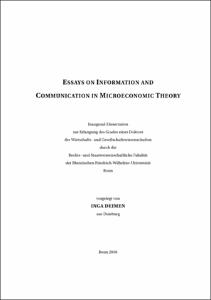Deimen, Inga: Essays on Information and Communication in Microeconomic Theory. - Bonn, 2016. - Dissertation, Rheinische Friedrich-Wilhelms-Universität Bonn.
Online-Ausgabe in bonndoc: https://nbn-resolving.org/urn:nbn:de:hbz:5-44035
Online-Ausgabe in bonndoc: https://nbn-resolving.org/urn:nbn:de:hbz:5-44035
@phdthesis{handle:20.500.11811/6819,
urn: https://nbn-resolving.org/urn:nbn:de:hbz:5-44035,
author = {{Inga Deimen}},
title = {Essays on Information and Communication in Microeconomic Theory},
school = {Rheinische Friedrich-Wilhelms-Universität Bonn},
year = 2016,
month = jun,
note = {This dissertation studies the role of information in three different microeconomic environments and introduces for each an independent theoretical model.
In the first chapter, we consider a deliberation and voting model in which rich state and signal spaces combine with a binary action space. In contrast to results obtained in the classical binary signal setup, we find that the truthful communication and sincere voting equilibrium is virtually always compatible with a positive probability of ex-post conflict among agents. Key is the aspect of consistency in the information structure, individual information is interpreted within the context of aggregate information.
In the second chapter, two divisions of a firm, overarched by a headquarters, are engaged in a decision problem. Division one obtains information and informs division two, who has the formal authority to make the decision. Headquarters guides the decision process by choosing the quality of information that division one obtains. We show that the communication equilibrium involves smooth strategies and is outcome equivalent to delegation. The crucial conditions are that conflicts are stochastic and unsystematic and that information is endogenous.
In the third chapter, a single agent faces two-dimensional uncertainty about her type and the production function. In each period the agent gathers information by experimentation with the level of effort. In our setting, we find that different types of agents react to failure in different ways, while some agents find it optimal to resign others prefer to increase their effort. Given an infinite-time horizon, agents may start and stop exerting effort repeatedly.},
url = {https://hdl.handle.net/20.500.11811/6819}
}
urn: https://nbn-resolving.org/urn:nbn:de:hbz:5-44035,
author = {{Inga Deimen}},
title = {Essays on Information and Communication in Microeconomic Theory},
school = {Rheinische Friedrich-Wilhelms-Universität Bonn},
year = 2016,
month = jun,
note = {This dissertation studies the role of information in three different microeconomic environments and introduces for each an independent theoretical model.
In the first chapter, we consider a deliberation and voting model in which rich state and signal spaces combine with a binary action space. In contrast to results obtained in the classical binary signal setup, we find that the truthful communication and sincere voting equilibrium is virtually always compatible with a positive probability of ex-post conflict among agents. Key is the aspect of consistency in the information structure, individual information is interpreted within the context of aggregate information.
In the second chapter, two divisions of a firm, overarched by a headquarters, are engaged in a decision problem. Division one obtains information and informs division two, who has the formal authority to make the decision. Headquarters guides the decision process by choosing the quality of information that division one obtains. We show that the communication equilibrium involves smooth strategies and is outcome equivalent to delegation. The crucial conditions are that conflicts are stochastic and unsystematic and that information is endogenous.
In the third chapter, a single agent faces two-dimensional uncertainty about her type and the production function. In each period the agent gathers information by experimentation with the level of effort. In our setting, we find that different types of agents react to failure in different ways, while some agents find it optimal to resign others prefer to increase their effort. Given an infinite-time horizon, agents may start and stop exerting effort repeatedly.},
url = {https://hdl.handle.net/20.500.11811/6819}
}






